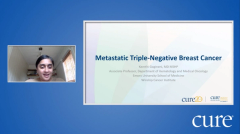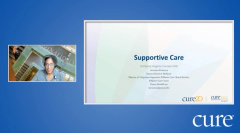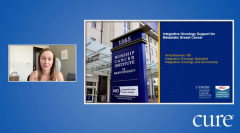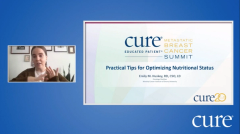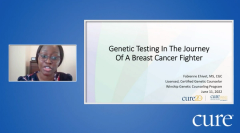
Educated Patient® Metastatic Breast Cancer Summit Diet & Exercise Presentation: June 11, 2022
Watch Emily Huskey, from the Winship Cancer Institute of Emory University, discuss diet and exercise, during the CURE Educated Patient Metastatic Breast Cancer Summit.
While there is no one diet or lifestyle that will be right for everyone, there are some eating and exercise tips that can help patients with metastatic breast cancer live healthier lives, explained Emily M. Huskey, an oncology dietitian from the Winship Cancer Institute of Emory University.
Huskey discussed nutrition and exercise at the CURE® Educated Patient® Metastatic Breast Cancer Summit.
“There’s no real ideal diet across the board for metastatic breast cancer patients, but there’s certainly things that I think are applicable to all patients that are good to takeaway,” Huskey said.
Diets to Promote a Healthier Lifestyle
The Mediterranean or other anti-inflammatory diets can be used to help reduce the chronic inflammation that patients with cancer often face, according to Huskey. These diets include a lot of legumes, whole grains, olive oils, while also incorporating moderate amounts of fatty fish, poultry, seafood and some dairy.
“(Researchers) have done studies with breast cancer patients and (found that) an anti-inflammatory diet could reduce the risk of mortality,” Huskey said.
Diets high in antioxidants, which reduce the number of harmful cells in the body, can also help patients with metastatic breast cancer live a healthier life. Foods such as berries and fruit, as well as coffee and green tea are all high in antioxidants.
However, patients should be cautious about their antioxidant intake, especially as many of these foods have high levels of vitamin C.
“Make sure you’re cautious about antioxidants in high doses during treatment,” Huskey said. “Typically, I caution my patients who are supplementing with more than 500 mg of vitamin C per day… Let your (treatment or nutrition) team know, and they can certainly guide you through that.”
Mediterranean and antioxidant-rich diets both put a focus on fruits, vegetables, nuts and legumes, and plant-based diets have also been shown to be beneficial, according to Huskey. When implementing a plant-based diet, individuals can look to foods like lentils, chickpeas, tofu or beans as sources of protein.
Huskey also noted that patients do not need to take an all-or-nothing approach when it comes to going plant-based or incorporating any other dietary changes.
“Maybe try a meatless Monday one night a week,” she said. “Pro-inflammatory foods don’t need to be eliminated from our diet entirely. My favorite food is pizza, so you’re not going to take that away from me. I will certainly eat it, but I try to eat it in moderation because I know it’s a little more processed. Or Maybe I’ll make it at home to try to reduce some of the pro-inflammatory (ingredients) in it.”
Whichever diet patients choose, they should put a focus on limiting processed foods (including margarine, refined carbohydrates and processed meats) as much as possible.
Huskey noted some easy swaps to decrease intake of processed foods, including making your own salad dressing instead of using store-bought and drinking plain seltzer water (and perhaps adding some fruit to it) instead of drinking soda.
Nutrition Misconceptions
While there are so many different diets being promoted online, in bookstores and on social media, Huskey emphasized that being educated about the topic can greatly help patients and their loved ones to mitigate the stress around figuring out which foods are right for them.
Just as there are many diets to choose from, there is also a plethora of misconceptions about nutrition, such as the fact that sugar feeds cancer — a question that Huskey said she is asked nearly every day.
“Sugar feeds all the cells in our body, including our cancer cells. But it doesn't necessarily mean that if you got rid of all sugar in your diet, like following a ketogenic diet, that that's going to get rid of the cancer, you'll just start to get glucose and the cells’ preferred form of energy from different things. So like muscle stores fat, which can lead to malnutrition and weight loss that's unintended,” she explained, noting that sugar does not drive cancer, and is found in many healthy foods, such as fruit and dairy – which, contrary to popular belief, also has not been proven to be associated with chronic inflammation.
Another common question that Huskey hears is about phytoestrogens, which are plant-based compounds frequently associated with soy-related foods. Some believe these to act like estrogen and, therefore, contribute to breast and other cancers.
“It’s very different from the human estrogen compound,” Huskey said. “So it’s really important, I think, to incorporate whole soy foods into your diet. That’s things like tofu, soy milk, edamame, tempeh.”
However, Huskey did note that patients with estrogen-positive breast cancer should be cautious with soy protein isolate or modified soy protein, which are heavily processed and typically found in things like protein supplements and meat alternatives.
Physical Activity
Having a healthy diet is not the only lifestyle factor that can reduce inflammation — aerobic and resistance exercise can be helpful, too, while also helping patients feel better during and after their treatment.
“(Researchers) studied patients with advanced-stage cancer and found that incorporating physical activity helps with depression, anxiety, stress, pain management, fatigue, constipation, really a whole gamut of symptoms,” Huskey said. “For (patients with breast cancer) specifically, if you’re on treatment that affects your ovaries, this affects your bone density and reduces bone density compared to the general population.”
Vitamin D is also key in promoting bone health, and deficits in the vitamin have been linked to a variety of other conditions, like depression, type 2 diabetes and impaired cognitive function.
Studies have shown that weight-bearing exercises, such as lifting weights or using resistance bands, has been shown to improve bone density. Additionally, supplementation, eating fish, beef, liver and egg yolks, as well as spending time outside, can all improve vitamin D levels.
“As much as you can, try to get up and moving throughout the day,” Huskey said.
For more news on cancer updates, research and education, don’t forget to

